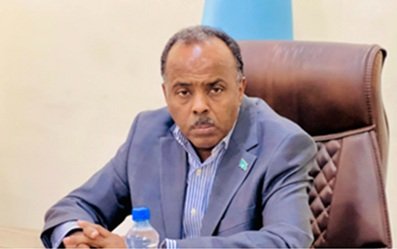Mogadishu (WDN)- Somalia’s State Minister for Foreign Affairs, Mr. Ali Balcad, came under heavy criticism Sunday after launching a scathing attack on a local council election held in Balcad district, describing it as outdated and illegitimate. However, his remarks have been widely condemned as detached from the complex realities on the ground—particularly the overwhelming security and governance challenges that make universal suffrage nearly impossible across most of Somalia, with Puntland as the only notable exception.
The election, held in Balcad town in Middle Shabelle, saw Qaasim Furdug re-elected as district commissioner through an indirect vote conducted by a newly appointed local council. Despite having no formal mandate over electoral matters, the state minister condemned the vote, claiming it ran counter to Somalia’s shift toward one person, one vote—a model aggressively pushed by Villa Somalia but seen by many as more aspirational than actionable.
“It is a great misfortune that while the country is preparing for inclusive elections and voter registration is underway, the Hirshabelle administration is wasting time on outdated indirect elections,” Ali Balcad said. He went on to praise Galmudug and South West states for launching voter registration exercises and called on Hirshabelle’s President Ali Gudlawe to follow suit.
Yet critics argue that such statements reflect either deep confusion or calculated misrepresentation. Both Galmudug and South West are operating under expired mandates and are widely perceived as political extensions of Villa Somalia rather than legitimate, independent administrations. Their so-called voter registration efforts have been dismissed as symbolic gestures designed to give the illusion of democratic progress.
More troubling is the State Minister’s apparent blindness to the security conditions in Hirshabelle. Balcad District, located just 25 minutes from Mogadishu, remains under constant threat from Al-Shabaab. The militant group controls large swathes of surrounding territory, retains the ability to enter Balcad at will, and even dominates the critical road linking the district to Jowhar—taxing travelers and goods with impunity.
“It’s astonishing that a senior government official speaks of inclusive elections in territories where the government barely exists,” said a Mogadishu-based political analyst. “Balcad District is essentially surrounded by Al-Shabaab, yet Minister Balcad lectures local leaders for holding the only type of election that is even remotely feasible.”
The State Minister himself is emblematic of the detachment plaguing many federal officials—commuting to his ministry in a bulletproof vehicle, escorted by a heavily armed motorcade, while ordinary citizens in Hirshabelle live under the constant threat of extremist violence.
Observers argue that Minister Balcad’s remarks fit into a broader pattern of “fantasy politics” emanating from Mogadishu, where officials in fortified compounds promote lofty ideals while ignoring the insecurity, displacement, and administrative breakdown gripping most of the country.
The contrast with Puntland could not be starker. In 2023, Puntland successfully held one person, one vote local council elections in 36 districts, setting a national benchmark. Thanks to its relative stability, functioning institutions, and security apparatus, it remains the only federal member state where direct elections have been both possible and credible.
“Puntland didn’t just talk about democracy—it implemented it,” said a former national elections commissioner. “No other region—not Hirshabelle, Southwest not Galmudug—is in any realistic position to do the same under current conditions.”
Critics further argue that while indirect elections are far from ideal, they remain the only operational mechanism for sustaining governance in Somalia’s most insecure regions. In places like Balcad, indirect voting may be the only viable option for preserving local administration and preventing total institutional collapse.
Many see Mr. Ali Balcad’s criticism not as a serious policy stance but as a political performance—aimed more at appeasing Villa Somalia than addressing the realities faced by the Somali people.
In the eyes of many, local elections like the one held in Balcad represent a pragmatic step forward, not a regression. And unless Somalia’s leadership confronts the country’s deteriorating security situation head-on and begins building sustainable institutions across all federal member states, Puntland will remain the exception—rather than the model.
WardheerNews


Leave a Reply